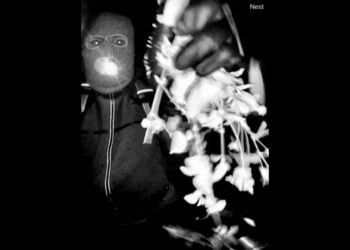There is something so safe about a biscuit. Maybe it’s because I’m Southern, but to me it remains a true symbol of warmth, welcome and genuine care. You don’t often make biscuits for fancy events. Ordinarily, biscuits are reserved for mornings with your most intimate life partners, still warm right off the pan and slathered in molasses or Louisiana cane syrup or even, at their fanciest, at a family gathering over a holiday table.
I believe they represent something specific beyond comfort or hospitality as well, something that feels more like familiarity and acceptance. So it’s no surprise to me that in Nashville, a place I called home for more than two decades, the biscuit has become a subversive tool to remind people that in the South we not only feed one another, but we use food to show care in important ways beyond hunger.
Alex Humbretch and Zach Halfill have been doing this for five years. Their bakery, Guerilla Bizkits, was initially born out of the twin Nashville emergencies of the 2020 tornadoes and the pandemic. Humbretch and Halfill’s original idea was to provide some sustenance for neighbors during disaster recovery. But when their own livelihoods fell victim to the pandemic, the couple decided to create jobs for themselves out of their home, which eventually turned into a brick-and-mortar business. Their biscuits — vegan, flaky and perfectly pitched for holiday tables and conversations — have become an East Nashville catalyst for comfort and care.
Through this simple act of baking, Humbretch and Halfhill have created a safe haven for their community. They later added various forms of care packages, starting with simple health care items like free condoms, Narcan and emergency contraception.
Baking has been a subversive form of resistance for generations.
Guerilla Bizkit has also expanded more specifically toward the transgender community by offering care kits for gender-affirming procedures. The first kit can be preordered free before any gender-affirming surgery. It contains things like nurturing biscuits to be baked at home and homemade jam, but also more practical, post-surgery items like bendy straws for comfort and latex gloves for surgical wound care.
Humbretch says this has been a successful endeavor in Middle Tennessee as both a source of care for the trans community and their caretakers, as well as a resource for education and outreach at large. Additionally a Harm Reduction Toolkit, organized through Distribute Aid, provides bulk supplies to local partners nationwide, like Guerilla Bizkit, to distribute kits providing a year’s supply of everything-but-the-meds for trans people in their community. The mission statement for the Harm Reduction Toolkit reads in part: “We need to keep trans people safe. These kits reduce the financial burden of taking inject-based gender affirming hormone therapy, and the one-year supply prevents disruption of care due to lack of funds.”
Baking has been a subversive form of resistance for generations. And my Southern heart takes pride that something as rooted in this region’s culture as the biscuit, something that is held sacred and delicious, is at the center of this D.I.Y. ethos — one that is not asking permission, one that is not waiting for support, one that is rooted in simply doing a thing for our community. This is the South I recognize: caring people, kind people, watchful people with a history of being a bunch of subverts meeting tyranny and oppression with equal parts edge, care, tenderness and incredible biscuits.
The post There’s Just Something Safe and Comforting About a Biscuit appeared first on New York Times.




